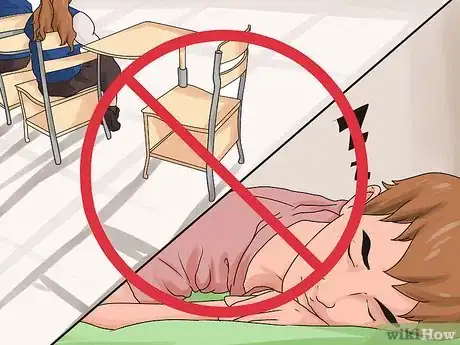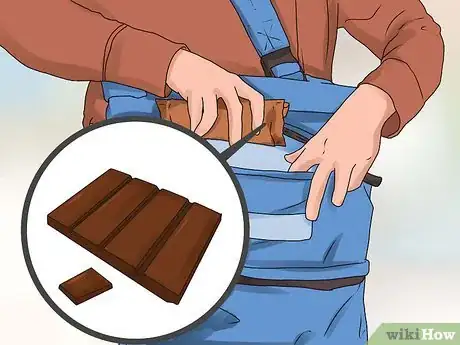X
wikiHow is a “wiki,” similar to Wikipedia, which means that many of our articles are co-written by multiple authors. To create this article, 18 people, some anonymous, worked to edit and improve it over time.
There are 12 references cited in this article, which can be found at the bottom of the page.
This article has been viewed 32,063 times.
Learn more...
Summer school can be a great opportunity to catch up on credits, get ahead with coursework, or retake a class so you don't have to repeat it next year. While your idea of a perfect summer probably doesn't include sitting in a classroom and doing homework, you can still have fun and get your work done if you plan carefully.
Steps
Method 1
Method 1 of 3:
Preparing for Summer School
-
1Review your notes and old tests if you are re-taking a class. Though your summer course won't be an exact replica of the class you just took, you'll be priming yourself for what's to come. It may adjust your way of thinking, studying, and note-taking to the kind of material you'll need to learn.[1]
- Keep in mind that there will be plenty of overlap and similarities in your classes, but don't think your old test will give you all the answers for your summer school exams. Use your old tests instead as study guides and a tool to see where you struggled last time.
-
2Talk to your friends and family about your goals for the summer. Your friends who aren't in summer school are probably going to miss you, and may ask you to abandon your studies for a night of fun or to skip a day here or there so you can all go to the beach. It's going to be hard enough to get through summer school already, and the last thing you need is someone trying to tempt you.
- Tell your friends that it's very important you do well in this class and that you will spend time with them after you've finished your homework, or on weekends, and definitely when school is over.
- Make sure you have your family's support as well. Let them know you may need their help to stay motivated. They may be able to help you make a study schedule.
Advertisement -
3Plan something big to look forward to after school is over. It's going to be hard to see other people going on vacation and relaxing while you're trying to cram a year or semester's worth of school into a few weeks. Knowing something special is waiting for you at the end of summer school--a vacation, a camping getaway with your friends, or a day at your favorite theme park--can help keep you motivated.[2]
- Set up smaller rewards throughout the course. Do something special (like a Saturday at the beach) for the weekend after your mid-term exam. These little happiness "checkpoints" will help break up the course and make it seem manageable.[3]
- Knowing you have something fun coming up will help lift your spirits when you feel like your summer is slipping away. You can remind yourself: "I just have to work hard the next two weeks and then I get to spend the day at the waterpark with my friends."[4]
Advertisement
Method 2
Method 2 of 3:
Surviving Class
-
1Put your phone away. Keep your phone out of sight. Even if it's just your mom texting what you want for dinner or your friend asking to meet up after class, once you see your screen light up, your concentration is broken.[5] It’s too easy to get lost in Facebook updates and game notifications. Put your phone in your bag and only check it on your breaks.
- Even if you just glance at your phone to see your friend’s message, “What are we doing tonight?”, you’re going to start thinking about your plans and miss what your teacher is saying.
-
2Don't miss any classes. As you know, summer school is a condensed version of a class that is normally a semester or even a year long. Your teacher will be cramming a ton of information into each class—in some cases, missing one day can be equivalent to several days, a week, or even two weeks of school.
- Your school probably has a policy that if you miss a certain number of days, the course won’t count, and you’ll have wasted your time (and money—they probably won’t refund the cost of the class, either).
- Make sure you arrive on time to your classes as well. Some schools will count excessive tardies as absences (so being late four times might count as an absence). Too many tardies or absences and you may lose credit for the course.
-
3Make friends with the people sitting near you. If you already know people in your class, that’s great! Otherwise, try introducing yourself to the person sitting next to you and ask to exchange numbers. Now you have someone to contact when you’re confused about homework or due dates, a possible study buddy, and maybe even a friend you’ll keep after school is over.[6]
- If you make friends in your class, it’s going to make it a little easier to get through the day. You’ll have someone to commiserate with during lunch and an automatic partner on any group work.
-
4Bring snacks that will increase your concentration and keep you alert. When you’re trying to focus, the last thing you need to be worrying about is hunger pangs or a lack of energy. Bring some “brain food” to class so you can stay focused.
- Bring some squares of dark chocolate, which provides energy in the form of caffeine and antioxidants that increase brain function.[7]
- Walnuts or other foods with omega 3’s improve concentration and help your brain process information.[8]
- Blueberries can improve your short term memory. Bring these for snack or to eat at lunch.[9]
- Make sure you stay hydrated, too. Dehydration can affect your concentration and memory and can make you tired and moody, too.[10]
-
5Force yourself to participate. It may count toward your grade, for one thing, but participating in class can also make lectures more interesting. If you are participating in class, you must listen and think critically about the material. It will keep you alert and engaged.[11]
- Studies show that by hearing, seeing, and participating, you are more likely to remember and understand the material than if you are passive.[12]
- Don’t be afraid of answering incorrectly. It’s better to get something wrong when your teacher can help guide you toward the right answer than getting it wrong on a test.
- Sit closer to the front and increase the likelihood you will participate and stay engaged. Students who sit in the front of the class tend to be more attentive and answer more questions.[13]
Advertisement
Method 3
Method 3 of 3:
Managing Homework and Studying
-
1Make a schedule for when you’ll study and finish assignments—and stick to it. Because you’re covering so much material in such a short amount of time, you can’t afford to procrastinate and fall behind. Making a schedule that lays out when you work on homework, when you will write essays, and when you have to study for exams can make it much easier to stay on top of your work. Putting things off even for a day or two can leave you overwhelmed with work.[14]
- Make sure you schedule in some down time as well. It’s important you keep up with your studies, but if you don’t take breaks to see friends, go out to dinner, and enjoy the sun a little bit, you’ll burn out quickly.[15]
-
2Try studying outside. If you’re stuck inside a classroom for hours and then have to go home and study, you may start to feel like you’re missing out on some of the benefits of summer—the sun, the green grass, the warm air. Find a spot outdoors that is quiet and comfortable and soak up some summer while you study.
- Make sure you’re not somewhere too public—if there are people screaming and laughing and throwing frisbees around you, it will be difficult to focus. Choose someplace without tons of distractions so you can focus.<
- If studying outside is too distracting, then reward yourself by going outside during study breaks. Take a walk or go get some ice cream before you get back to the grind.
-
3Get enough sleep. It may be tempting to stay up late into the night with your friends, but sleep deprivation can have a major impact on your performance at school. Lack of sleep can make it difficult to learn and retain information.
- You should be getting at least nine hours of sleep every night.[16]
- Sleep deprivation has been shown to be a factor in lower test scores, concentration, tardiness, and decreased attention span.[17]
- If your class starts mid-summer and you’re already used to staying up late, make sure you give yourself a few days to adjust to your new schedule before school starts. It will be tempting to continue sleeping late as long as possible, but it will make it easier to get up that first morning if it’s already becoming a habit.
Advertisement
Warnings
- Some parents send their children to summer school to punish them for "bad grades." If this is the case with you, understand that your parents are trying to teach you responsibility for the choices you make.⧼thumbs_response⧽
Advertisement
References
- ↑ http://www.nytimes.com/2014/09/07/magazine/why-flunking-exams-is-actually-a-good-thing.html
- ↑ http://psychcentral.com/blog/archives/2012/08/12/lifes-checkpoints-increasing-motivation-and-happiness/
- ↑ http://psychcentral.com/blog/archives/2012/08/12/lifes-checkpoints-increasing-motivation-and-happiness/
- ↑ http://psychcentral.com/blog/archives/2012/08/12/lifes-checkpoints-increasing-motivation-and-happiness/
- ↑ http://theodysseyonline.com/uta/5-tips-survive-summer-school/109761
- ↑ http://theodysseyonline.com/uta/5-tips-survive-summer-school/109761
- ↑ http://www.nutritionist-resource.org.uk/nutritionist-articles/six-foods-that-help-with-concentration-and-why
- ↑ http://www.nutritionist-resource.org.uk/nutritionist-articles/six-foods-that-help-with-concentration-and-why
- ↑ http://www.bbcgoodfood.com/howto/guide/10-foods-boost-your-brainpower
- ↑ http://psychcentral.com/news/2012/02/20/dehydration-influences-mood-cognition/35037.html
- ↑ http://www.school-for-champions.com/grades/class_participation_improves_grades.htm#.VfEMqZ3BzGc
- ↑ http://www.school-for-champions.com/grades/class_participation_improves_grades.htm#.VfEMqZ3BzGc
- ↑ https://k12teacherstaffdevelopment.com/tlb/do-seating-arrangements-have-an-impact-on-student-learning/
- ↑ http://www.lifehack.org/articles/communication/how-to-help-your-teen-hack-summer-school.html
- ↑ http://talentegg.ca/incubator/2012/06/29/how-to-survive-summer-school/
- ↑ https://www.theatlantic.com/education/archive/2014/08/surprise-students-arent-getting-enough-sleep/379020/
- ↑ https://www.theatlantic.com/education/archive/2014/08/surprise-students-arent-getting-enough-sleep/379020/
About This Article
Advertisement
































































